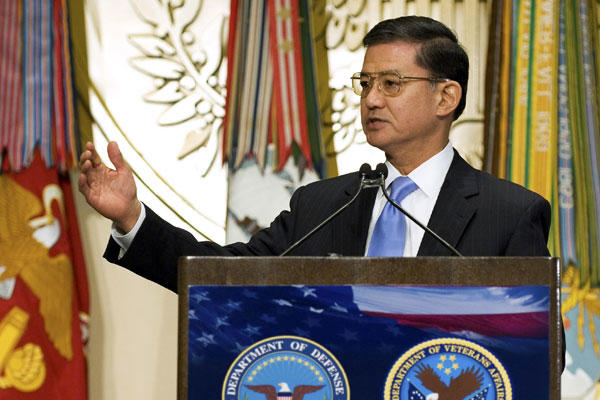Allegations that veterans died awaiting care at the Department of Veterans Affairs Medical Center in Arizona comes two years after a former VA official warned Congress that manipulation of patient appointments was a systemic problem.
Nicholas Tolentino, a former mental health administrator at the VA Medical Center in Manchester, New Hampshire, said in April 2012 that VA hospital managers across the country regularly sought loopholes to get around meeting performance requirements.
The officials also had a financial incentive to game the system, since the numbers were tied to bonuses worth thousands of dollars a year, said Tolentino, an Iraq and Afghanistan combat vet who served 14 years in the Navy before being medically retired.
"The upshot of these all too widespread practices is that meeting a performance target, rather than meeting the needs of the veteran, becomes the overriding priority in providing care," he told Congress.
Veterans' organizations on Thursday had harsh words for the VA over a CNN report that 40 vets died awaiting care at the Phoenix, Arizona hospital, including many on a secret list intended to hide just how long patients were waiting to see a doctor.
The hidden list, which numbered between 1,400 and 1,600 names, was separate from an official wait list that was reported back to VA headquarters in Washington, CNN reported.
CNN's source for its information is Dr. Sam Foote, who recently retired after a 24-year career with the Phoenix VA hospital. CNN said it confirmed Foote's information with several other high-level VA staffers.
"Regarding VA leadership in Phoenix, there is zero trust in their ability to lead, much less to properly care for America's heroes," Veterans of Foreign Wars National Commander William A. Thien said on Thursday. "If the allegations of veterans dying as a result of this internal process are true, then the individuals responsible should be prosecuted criminally to the fullest extent of the law. The Secretary of Veterans Affairs needs to fire them all, then let the lawyers sort it out."
American Legion National Commander Daniel Dellinger said the Phoenix report, if true, "is a new low in a string of breakdowns at VA medical centers, recalling the avoidable deaths of patients at VA hospitals in Columbia, South Carolina, Augusta, Georgia, and Jackson, Mississippi.
"We're going to find out what happened in Phoenix," Dellinger said. "We are going to find out who was responsible for this secret list and if they are still working for VA. These preventable deaths keep mounting, and yet we see not a single VA manager being held accountable."
Paul Rieckhoff, executive director and founder of Iraq and Afghanistan Veterans of America, called the allegations at Phoenix VA "shockingly unacceptable."
The VA did not comment on any of the specifics in the CNN report, but in a statement Thursday, VA spokesman Drew Brookie said the Phoenix hospital is taking the allegations very seriously. He said officials there have asked the VA Office of the Inspector to conduct a comprehensive investigation.
He also said the VA has sent a team of clinical experts to the Phoenix facility to review appointment scheduling procedures and the existence of any delays in care.
"If these reviews find any areas that need to be improved, VA will address them swiftly, as our mission is to provide the best care possible to our veterans," Brookie said.
Senate Veterans Affairs Committee Chairman Sen. Bernie Sanders, I-Vermont, said his panel will hold a hearing on the Phoenix allegations once the IG completes its investigation.
In his testimony two years ago Tolentino referenced an Electronic Waiting List that sounds very much like the secret list that is being reported by CNN. The purpose of the EWL is so that VA officials can "track demand versus the availability of services," Tolentino testified.
In the case of the Manchester VA hospital, however, the list was not secret – it was non-existent because management did not want to know the numbers.
Tolentino told Congress that hospital managers "officially ordered" that the electronic list was not to be used under any circumstances.
Tolentino said offering bonuses to managers to make sure they met performance requirements "creates a perverse administrative incentive to find and exploit loopholes ... that will allow the facility to meet its numbers without actually providing the services or meeting the expectation the measure dictates."
Whenever new requirements are issued Veterans Integrated Service Network leaders, facility managers, quality management staff, and service line staff start looking for workarounds, he said.
CNN, in its Wednesday report, said that Phoenix VA director Sharon Helman earned a $9,345 bonus in 2013, on top of her annual salary of $169,900.
The VA has come under fire for years over long wait times for veterans seeking care.
Last month, the department was forced to defend itself against allegations the Lost Angeles VA Medical Center purged its records system of thousands of medical appointment requests starting in 2009.
A former Marine working as a scheduling clerk at the hospital told The Daily Caller that he was ordered to delete the appointments to make it appear the center was not way behind in getting vets in for requested appointments, particularly for MRIs.
VA spokesman Drew Brookie said the deletions were properly done after an extensive review. VA policy is that if patients do not show up for appointments or fail to respond to scheduling attempts, the test orders are discontinued after 12 months because anything older than that would not be medically relevant.
-- Bryant Jordan can be reach at bryant.jordan@monster.com




























